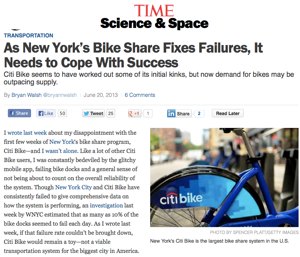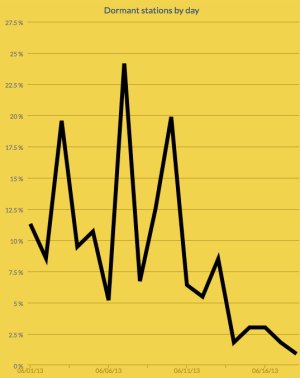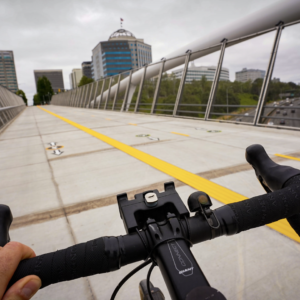
Five weeks in, New York City’s new bike share system seems to be doing just fine.
Initially plagued with problems (and negative headlines), Citi Bike’s main issue these days is keeping up with demand for the popular new mode of transit.
“After two weeks of using the program pretty much every day to get from Grand Central to the office in the morning (a block from Penn Station) and back in the evening, plus a few other trips here and there, I can’t say how much I love this program,” a man named Mike Cordelli wrote on Citi Bike’s Facebook page Wednesday afternoon.
As we (and many other news outlets) wrote last month, Citi Bike, managed by Portland-based Alta Bicycle Share, had serious problems as it was getting off the ground. An estimated one in 10 docks were failing to accept or release bikes. Membership keys were delayed. Customer service lines were clogged.
Fast forward a few weeks: Citi Bike’s 100,000 annual, weekly and and daily members are logging 150,000 trips a week. And those trips, many of which don’t involve helmets, seem to be 2.5 times safer than the average New York City bicycle trip, Streetsblog NYC estimated Wednesday.
Software failure rates, meanwhile, have declined from 10 percent to 2.5 percent, WNYC reported last month:

“This new data suggests that software and equipment issues, which have been reported as being connected with the inability of the solar panel to fully charge batteries, have been mended,” industry news site Bikeshare.com wrote.
“Every age, income, party, gender and educational group supports the bike program.”
— Quinnipac University pollsters
Maybe this is why “every age, income, party, gender and educational group supports the bike[sharing] program,” according to a Quinnipac University poll conducted after Citi Bike’s launch.
Citi Bike was the first test of a new generation of software used by Alta’s bikesharing systems. Divvy Bikes, which launched last week in Chicago, was the second. Though there’s no telling that everything will keep coming up roses, it’s time for everyone to recognize that bike sharing in New York basically seems to be working, just as it has in Paris, London, Minneapolis, Miami and numerous cities around the world.
When Portland finally gets bike share sometime next year (we hope), it will likely come with its share of “sky is falling!” headlines. When that happens, let’s remember New York City’s experience and just keep calm. The debate of whether or not bike share works should be over. The only question that remains is how to make it work even better.
Stay tuned for more coverage next week of Alta’s ongoing issues with its Washington D.C. labor contract.







Thanks for reading.
BikePortland has served this community with independent community journalism since 2005. We rely on subscriptions from readers like you to survive. Your financial support is vital in keeping this valuable resource alive and well.
Please subscribe today to strengthen and expand our work.
So the solar panels weren’t getting enough sunlight? Maybe due to the tall buildings? I wonder what will happen in winter, when there is so much less sun?
The real debate hasn’t begun yet, everything so far has been just noise. I’m pretty sure things will keep coming up roses for bike sharing in the near future, but eventually roses die.
Btw, all these numbers Alta Bike Share/CitiBike keep touting are meaningless, the most important number that everyone should be concerned with is the number bicycle related deaths since the introduction of these bike sharing programs. If there is no significant drop in deaths, then the resources spent on these bike sharing programs will have been a complete waste.
Jonathan, time to move to a reputation based commenting system that records and displays IP addresses as well as allows users to up and down vote comments by other users and filter by reputation. That’ll clear up this quality problem you have in your comments today.
I actually wish there was a real-life reputation based system. That way we can group all of those who supported bike sharing programs in one group and all of those (only me, maybe?) who didn’t in another group. So, in the future, the group who were wrong about bike sharing would lose all their credibility on livable city/streets issues. And, if they are in a position that influences the direction of the livable city/streets movement, they would be removed/banned from their positions.
Good god…. This may be the best news I have read all day!
I never claimed to EVER understand the politics/business/implementation of a bike share system.
I have spent LOTS of time in NY. NY’ers are tuff/stalwarts/ridgid in many ways…..I was even wincing as my beloved Jon Stewart poked left handed jabs at bike share recently.
It always seemed to me that progressively minded people would wake up to the idea that bike share is a good thing…call my a dreamer, I guess.
Well, it seems that it is.
Now all the nincompoops, can go piss off.
I cant wait to see bike shares in every city, EVERYWHERE!
YES TO BIKE SHARE/NO TO NARROW MINDED CYCLING SOOTHSAYERS AND FALSE PROPHETS!!!
(that’s directed at you ANON14233142)
My comment is a legitimate question. I couldn’t find any detail about the specific issues they were having with the solar chargers. That seems to be one of the main selling points of these systems (adaptable, mobile). Having to connect it to the grid to charge adds a lot of expense.
I had no issue with your question Chris. Good one. anon was just trying to stir up sh*t and now that he’s been pressed, he seems to be improving the quality of his comments ever so slightly
As far as the effectiveness of the solar panels in winter, are they going to leave the system in place year-round? In Minneapolis, whose system I just used a couple weeks ago, they take the bikes and stations off the streets for the winter months. NYC’s winter weather isn’t as extreme as Minneapolis’, but it’s still basically a snowy-winter climate.
Also, is there THAT much less usable sun in NYC winters? Unlike the Pacific Northwest, many cities east of the Rockies have more sun in the winter than the summer, though of course the angle (and usable power output) is lower.
Wow. That really clears it all up for me anon. Thanks buddy.
What are the top 3 reasons for having a bike sharing program? And, please, order them by importance.
My personal opinion:
1. Reducing auto use in the city
2. Reducing pollution
3. Encouraging a more active populous.
And these systems accomplish all three, quite well, and at a low cost to the taxpayer.
While I wait for Jeff to answer my question, let me ask you this: Who are the primary users of these bike sharing programs? Now, take those users and ask the following: 1. Are these users already contributing to the reduction of auto use? 2. Are these users already contributing to the reduction of pollution? 3. Are these users already part of the active populous?
1. Maybe
2. Maybe
3. Maybe
I’ll throw this anecdote at you: a relative of mine works downtown. His company offers shared bikes that employees can use at as needed. Instead of driving his car across town for lunch, he will often use one of these bikes. He drives from Tigard every day, so he’s not going to be riding his bike downtown. Most companies downtown do not offer this option. This is just one type of user, there are countless other examples. I honestly don’t know how anyone who calls themselves a cyclist can be against bikeshare. The more bikes downtown, the better. Would you prefer the city spend the money on car parking garages?
You say “I honestly don’t know how anyone who calls themselves a cyclist can be against bikeshare.”
I know lots of “hardcore” cycists (those in the 1% that have always biked, will always bike, doesn’t matter much the conditions, etc… like me and many on this list) who are against bike shares: they see them as very expensive ($5,000-$20,000 per bike, depending on how you count it) with no benefit to what we sometimes see as the “cycling community.” I won’t hardly ever use a bike share in my hometown, because I bike everywhere on my own bike.
That said, as a native New Yorker, I appreciate what it could do for NY – for all those trips of 10-60 blocks (0.5-3 miles) that are a bit of a drag on public transport, relatively expensive by cab and long by foot, can be SUPER easy on a bike from a bike share.
So, I think in places like New York it makes a lot of sense. But we will hve to let the numbers speak after a few months.
On that note – I am glad the citibike site has added some systems data.
The answers to all three questions are “YES AND NO” You keep trying to pigeonhole bikeshare users into one group or demographic. But that’s like pegging all drivers into one or all transit riders. There are going to be people who own bikes, there are going to be people who don’t own bikes. There are going to be people who would have driven or walked or taken the bus/MAX, and there are going to be people like you who just keep doing what they’re doing already.
Again, I’ll ask you: how will bikeshare negatively affect you (keeping in mind it is privately funded, so no tax dollars)? Sounds like you’re thinking it will increase bicycle crashes? The above article says that’s not true. And more cyclists on the streets is going to pressure the city/county/state for more bike infrastructure.
Again, I’ll also ask you: have you ever used bikeshare?
Really, and I thought it was all about choices, choices, and more choices!
1. offering people more choices for transportation
2. giving people a set of wheels in the city that are convenient to access, in case they didn’t drive a car or ride a bike of their own
3. you don’t have to own your own bike and maintain it/worry about someone stealing it
+ Or haul it up/down stairs and store it in a small apartment!
A big “F U” to the doubters in the previous story, eh?
Don’t forget that bikes are generally faster in NYC than cars or the bus!
1. no circling the block looking for parking
2. don’t have to wait for a bus
3. easy to bypass congestion by lane-splitting or using dedicated cycle lanes/tracks
Bikes are faster in every city, but that’s not the point. The point isn’t ‘I wanna go faster!’, the point should be ‘I don’t want to be locked inside this steel death-trap’.
I’m looking forward to more debate and results.
Even a few weeks ago, Citibikes worked so well that I didn’t take a cab once in a three day business trip to mid-town (I mean within Manhattan, excluding to/from airport). Hmm, I did the math . . . I go to NYC for work 4-5 times a year, take 4-6 cab rides each trip, a $99 annual membership will pay for itself by the 2nd trip . . . I bought a membership.
Having just used Minneapolis’ bikeshare program a couple years ago, I can answer anon’s questions about MY use of their system: I travel there frequently, and usually get around exclusively by car. I’ve often wanted to bring my folding bike there, but the constraints of these visits don’t allow me to get around 100% by bike, and with a whole family’s luggage it’s difficult to justify bringing the bike for myself too.
But on this visit, even though I did rent a car because I needed to also leave town, I PARKED it and used the Nice Ride system to visit places that I would otherwise have driven to. My use of these bikes was as a tourist rather than resident, but my use of these bikes genuinely did reduce driving and pollution, and at least when I’m in Minnesota I’m not usually part of the “active populace“.
By the way, I thought the system worked well. The bikes ride pretty much like your typical 3-speed comfort bike, except the Shimano roller brakes are truly craptacular in stopping ability. Too bad Alta didn’t spring for the much better Sturmey-Archer drums. It’s pretty hard to go very fast at all on these bikes, but at more moderate 10-12mph speeds they work just fine. I did have a problem with the first station I tried to use – the touchscreen was frozen when I first got there, and after I had customer service reboot it remotely it still didn’t accept my input properly. But I just walked to another station two blocks away, and everything worked flawlessly from there. I ended up doing about 25 miles on 2 different bikes rented in different parts of town (including a one-way trip that also involved use of their light rail), and it was blissful using a bike instead of a car.
I still have my concerns about the amount of public money used to pay
Public money? Some US bike shares have been privately run (thus the need for massive ad on the bikes/stations). Seems like a mixed bag of funding, but public money doesn’t have to be spent to get the systems running (i.e. NYC). Seems to me if there was more public funding in the bike shares they should be more integrated with the local transit systems (which as you saw is definitely not the case in Minneapolis).
http://en.wikipedia.org/wiki/Citi_Bike
http://en.wikipedia.org/wiki/Citi_Bike
http://en.wikipedia.org/wiki/Capital_Bikeshare
NYC’s bikeshare is all privately funded. That won’t be possible everywhere. In many cities, bikeshares will have to compete with other transportation modes for public budget dollars. I suspect they are pretty inexpensive as these things go, but I’m not positive.
By the way, anon sets up a list of goals that he thinks bikeshare must achieve for him to approve. That’s his opinion; no one else needs to agree with those goals. Does Citibikes “save lives”? Doubtful, but who cares. That’s a straw man.
I plan on replying to everyone who has replied to me later tonight. Just gotta take care of some stuff first, and I wanted to give some more thought on what people have said here.
Just make sure that you have the last word no matter what.
..”word”, bro.
The following below is basically my reply to most everyone who has replied to me so far in this discussion. The comments/replies are starting to get unwieldy, so I wanted to consolidate everything here to make this discussion easier to follow. Earlier, I asked the following questions:
1. “What are the top 3 reasons for having a bike sharing program? And, please, order them by importance.”
2. “Who are the primary users of these bike sharing programs? Now, take those users and ask the following: 1. Are these users already contributing to the reduction of auto use? 2. Are these users already contributing to the reduction of pollution? 3. Are these users already part of the active populous?”
The questions listed above were rhetorical questions that I asked in order to lead up to my main point: The primary users of these bike sharing programs are NOT people who use automobiles. Rather, these users are made up of pedestrians, transit riders, bicyclists, or any other human-powered vehicle riders, with a minority of them consisting of people using automobiles such as car drivers, car renters, carpoolers, or taxicab riders.
Now, in addition to my rhetorical questions, I made the following comment:
“Btw, all these numbers Alta Bike Share/CitiBike keep touting are meaningless, the most important number that everyone should be concerned with is the number bicycle related deaths since the introduction of these bike sharing programs. If there is no significant drop in deaths, then the resources spent on these bike sharing programs will have been a complete waste.”
So, with my rhetorical questions and my comment above, what am I trying to get at?
One of the top priorities, if not the number one priority, of local transportation departments and livable city/streets advocates is making our streets safe. The tried-and-true method to making streets safer for bicyclists is adding/improving bicycling infrastructure. Bike sharing programs are being promoted as another means to make streets safer for bicyclists. The hope is that they will almost instantaneously increase the number of bicyclists on the streets so that the “safety in numbers” effect will come into play. As a result, the presence of bicyclists on the streets would be more pronounced, motorists would become more attentive to bicyclists, and less bicycling accidents and/or fatalities would occur.
In order to determine the efficacy of these bike sharing programs, all we would need to do is look at the number of bicycling related deaths since they were implemented; hence, the reason I made the comment above. If there is a significant decrease in bicycling related deaths, then that would be a good indication these bike sharing programs do make streets safer for bicyclists. However, even if there is a significant drop in bicycling related deaths, there would have to be further investigation to determine the main contributing factor(s). Is it because of these bike sharing programs?, is it because of added/improved bicycling infrastructure?, etc. In any case, it is beyond this discussion; however, I do believe the contribution of these bike sharing programs in making streets safer for bicyclists will be negligible.
While we cannot determine the efficacy of these bike sharing programs until more time has passed, we can at least agree on one thing now–bike sharing programs provide a convenience. A convenience enjoyed primarily by pedestrians, transit riders, bicyclists, or any other human-powered vehicle riders. A pedestrian is able to reach their destination faster, a transit rider has a solution to the first/last mile problem of their trip, a bicyclist need not worry about the disadvantages of using their own bike, etc. It so happens that all of these users have at least 3 things in common: They all contribute to the reduction of automobile use, they all contribute to the reduction of pollution, and they all are part of the active populous.
In other words, if it is likely that these bike sharing programs will not make streets safer for bicyclists, and only serve as a convenience to people who are already contributing to making our streets safe, then the resources spent on these bike sharing programs will have been complete waste. This is one reason why I am vehemently against bike sharing.
NO TO BIKE SHARING, YES FOR REAL BICYCLISTS!